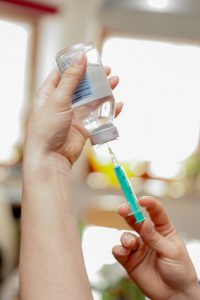2 Truths and a Lie about Vaccines
Author: Michaela Wachal, Clinical Pharmacist 
Before your kids head back to school, make sure they’re up to date on all their vaccinations. You may have questions about vaccine safety and potential side effects. As a pharmacist and a mother, I want what’s best for my kids. Let me assure you, vaccinations are safe for your family and save millions of lives every year. Keep reading to learn more about two truths and one giant lie about vaccines.
Truth: Vaccines Save Lives
Vaccines prevent between 2-3 million deaths every year, according to the World Health Organization. Measles is a great example of how vaccines save lives. This contagious disease can cause serious health problems or death. With measles immunizations becoming more effective and more available worldwide, the number of deaths from measles has dropped dramatically. Since 2000, the measles mortality rate has declined by 84 percent.
Vaccines have nearly eliminated diseases such as polio, diphtheria and others from the U.S. However, it’s still important to continue protecting against these diseases with vaccinations. When a large number of people are vaccinated, it reduces the chance of a contagious disease outbreak and protects people who can’t get vaccinated. A few people who have a contagious disease can spread the virus quickly without vaccinations. The Centers for Disease Control (CDC) reminds parents even though many vaccine-preventable diseases are under control today, they still exist. Contagious diseases, such as whooping cough, could become a big problem if people stop getting vaccinated.
Truth: Vaccines Are Safe
All vaccines must be tested and approved by the U.S. Food & Drug Administration (FDA). The FDA has a team of experts who carefully review the medicine to make sure it’s safe and effective. Sometimes people worry about certain ingredients in vaccines, such as mercury or formaldehyde. The FDA, CDC and others have done extensive research on vaccine ingredients. Some vaccines have ingredients that may be harmful if you take them in large quantities. If these ingredients are used in a vaccine, there’s only a tiny, non-toxic amount.
The American Academy of Allergy, Asthma & Immunology (AAAAI) reports that the amount of these ingredients you would get from a vaccine is much lower than what you would encounter on a regular day. For example, you’re exposed to low levels of mercury in milk and contact lens solution. Formaldehyde is in several common household products, like cough drops and cosmetics. Vaccines are tested and approved. You can trust that vaccine ingredients are safe for you to put into your body.
There has never been a credible, scientific study linking vaccines to permanent health conditions, according to PublicHealth.org. Some children experience normal vaccine side effects such as soreness at the injection site or a mild fever. In rare cases, your child may have an allergic reaction to the vaccine. Talk to your doctor if you have questions about vaccine side effects.
Lie: Vaccines Cause Autism
Many people worry that vaccinating their children may cause autism or other developmental disorders. This is not true. The man who first suggested a link between vaccines and autism lost his medical license and was discredited for poor research and bad science. The American Academy of Pediatrics collected a long list of scientific studies and their findings. None of the studies found a link between autism and vaccines or any complications from multiple vaccines given at one time. Parents can review this material and more to be confident in their decision to vaccinate their children. The CDC, FDA, WebMD, Autism Speaks, PolitiFact.com and numerous other reputable organizations address common misconceptions about vaccines and provide resources for more information.
Hy-Vee Pharmacy Solutions (HPS) encourages everyone who is able to get vaccinated. If you have questions about how vaccines will interact with your medication, talk to your doctor or HPS pharmacist. Visit KidsHealth.org for a complete list of recommended vaccines for children and help your kids have a good, healthy school year.
